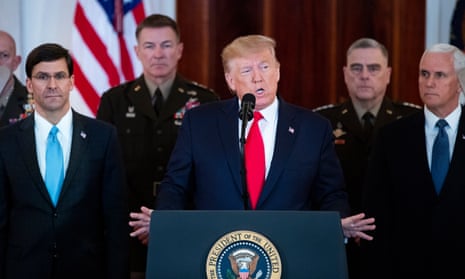Introduction
As President Donald Trump Iran strikes celebrated what he described as a “spectacular military success” following US strikes on Iran’s nuclear sites, a fierce political and legal storm erupted in Washington. Critics from both political parties, particularly Democrats, swiftly accused the president of violating the US Constitution by bypassing Congress to launch military action without prior authorization.
Trump Accused of Overstepping Presidential Authority
Senator Christopher Van Hollen Jr. was among the first to voice his condemnation, stating: “Trump said he would end wars; now he has dragged America into one. His actions are a clear violation of our Constitution.”

Under Article I of the US Constitution, only Congress holds the authority to declare war or authorize the use of military force. Although the president, as commander-in-chief, can act in emergencies or respond to sudden attacks, critics argue that Iran’s nuclear facilities, which have operated for years, posed no imminent threat to the United States Trump Iran strikes.
War Powers Resolution and Legislative Pushback
The controversy has reignited debates surrounding the War Powers Resolution of 1973, designed to limit presidential war-making authority following the Vietnam War. Progressive Congresswoman Alexandria Ocasio-Cortez declared: “He has impulsively risked launching a war that may ensnare us for generations. It is absolutely and clearly grounds for impeachment.”
Several lawmakers had previously introduced bills requiring the president to seek congressional approval before any military action against Iran. Yet, with Republicans controlling both the Senate and the House, Trump faces limited immediate legislative resistance.

Trump’s MAGA Base Split Over Military Escalation
Even among Trump’s core “Make America Great Again” (MAGA) supporters, the decision to launch strikes has stirred unease. Many of his voters oppose foreign wars, favoring his earlier promises to prioritize domestic issues like economic growth and avoid entangling the US in Middle Eastern conflicts.
As Trump’s supporters grapple with the contradiction between his campaign pledges and his current military action, political pressure continues to mount from both his base and opponents alike.
Legal Justification Under Scrutiny
Unlike previous administrations that cited legal frameworks such as the Authorization for Use of Military Force (AUMF) passed in 2001 and 2002 following the 9/11 attacks, Trump has yet to offer a specific legal rationale for the recent strikes. Those authorizations were originally intended to justify military action against terrorist groups like al-Qaeda and the invasion of Iraq—not for preemptive strikes against state actors like Iran.
Brian Finucane, a senior adviser with the International Crisis Group and former State Department lawyer, bluntly stated the attack was “patently illegal.” He argued that even under existing executive branch doctrines, the action likely constitutes “war” that requires congressional authorization.

Progressives Demand Accountability
Key progressive figures like Senator Bernie Sanders echoed constitutional concerns during a rally in Oklahoma. As he informed attendees of the strike, chants of “No more war!” erupted from the crowd. Sanders stressed: “It is so grossly unconstitutional. All of you know that the only entity that can take this country to war is the US Congress; the president does not have that right.”
Former Democratic House Speaker Nancy Pelosi also condemned Trump’s unilateral action, stating that lawmakers would be “demanding answers” from the administration. “Tonight, the President ignored the Constitution by unilaterally engaging our military without Congressional authorization,” she wrote on social media.
Historical Context: The Endless War Debate
The strikes have reignited memories of past US military interventions in Iraq, Afghanistan, Libya, and beyond—all waged under broad interpretations of existing military authorizations. These conflicts have cost trillions of dollars, resulted in the deaths of thousands of US soldiers, and destabilized entire regions.

Despite decades of war fatigue, the legal structures used to justify military interventions remain largely intact, giving modern presidents broad discretionary power in the absence of congressional action to revoke or reform outdated authorizations.
Can Congress Rein In Presidential Power?
While several lawmakers have proposed new legislation to restrict Trump’s military options, any such bill faces near-certain veto if it even reaches the president’s desk. Overriding a presidential veto would require a two-thirds majority in both chambers—an unlikely scenario given the current political makeup of Congress.
With impeachment off the table for now and limited tools to directly influence military decisions, Congress remains locked in a power struggle that reflects broader debates over executive authority that have spanned multiple presidencies.
Conclusion: A Constitutional Crisis in the Making?
Trump’s Iran strikes have once again spotlighted the fragile balance of power between the legislative and executive branches in the United States. As legal experts, lawmakers, and activists debate the president’s authority, questions linger about whether existing checks and balances are sufficient to prevent future unilateral wars.
The world watches as this constitutional battle unfolds, knowing that its outcome may not only shape America’s foreign policy but redefine the very limits of presidential power for years to come.
For full coverage of Trump’s full speech after the Iran attack, visit The Morning News Informer.